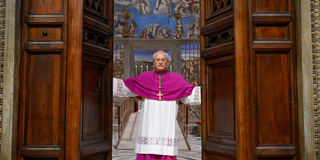Premium
Black smoke signals no pope in second round of voting

Black smoke rises from the chimney on the Sistine Chapel, indicating no decision has been made to elect a new pope, at the Vatican, May 8, 2025.
UPDATE:
Black smoke billowed from a chimney atop the Sistine Chapel on Thursday, signalling that the cardinals locked in a conclave have not yet chosen a new pope to guide the Roman Catholic Church.
Thousands of faithful gathered in St. Peter's Square waited for smoke to pour from the flue on the chapel's roof, which it did shortly before noon (1000 GMT).
The 133 cardinals under the age of 80 began the heavily ritualised and secret process on Wednesday, shut away in complete isolation as they pick a successor to the late Pope Francis.
They burn the ballot papers and mix them with chemicals to show how proceedings are going -- black signalling no pope and white announcing a new pontiff.
The cardinals held an initial inconclusive vote on Wednesday evening. They are scheduled to hold up to two more ballots on Thursday afternoon, with possible smoke signals expected some time after 5:30 p.m. (1830 EAT).
The red-hatted "princes of the Church" will keep on voting up to four times a day until someone wins a two-thirds majority.
No pope in modern times has been elected on the first attempt, so Wednesday's black smoke was widely expected. But given recent history, a final result is possible from the second day.
Francis, the first pope from Latin America, was elected on the evening of the second day of the last conclave, held in 2013, as was his predecessor, Benedict XVI, in 2005.
************

Archbishop Diego Giovanni Ravelli closes the doors of the Sistine Chapel, ahead of the conclave to elect the next pope at the Vatican, May 7, 2025.
The largest and most geographically diverse conclave in history was due to resume on Thursday, with Roman Catholic cardinals returning to the Sistine Chapel to try to settle a wide-open papal election.
The red-hatted "princes of the Church" started the heavily ritualised process of choosing a new leader for the world's 1.4 billion Catholics on Wednesday. In the evening, black smokebillowed from a specially-installed chimney visible from St Peter's Square to signal an inconclusive ballot.
No pope in modern times has been elected on the first attempt, so that outcome was widely expected. But given recent history, a final result is possible from the second day, when up to four rounds of voting can take place.
A record 133 cardinals from 70 countries are involved in the secret ballot, up from 115 from 48 nations in the last conclave in 2013 - growth that reflects efforts by the late Pope Francis to extend the reach of the Church during his 12-year tenure.
Argentine-born Francis, who died last month, was elected at the end of the second day, after five rounds of voting. Eight years earlier, it also took two days but only four votes to elevate Germany's Benedict XVI to the papacy.
White smoke would signal the election of a new Church leader.
There are no clear favourites, although Italian Cardinal Pietro Parolin, who served as the Vatican's number two under Francis, and Filipino Cardinal Luis Antonio Tagle are considered the front-runners.
If it becomes obvious that neither can obtain the necessary two-thirds majority, votes are expected to shift to other contenders, with the electors possibly coalescing around geography, doctrinal affinity or common languages.
Other potential "papabili" - papal candidates in Italian - are France's Jean-Marc Aveline, Hungary's Peter Erdo, American Robert Prevost and Italy's Pierbattista Pizzaballa.
During the conclave, cardinals are sequestered from the world and sworn to secrecy, their phones and computers confiscated, while they are shuttled between the Sistine Chapel for voting and two Vatican guesthouses to sleep and dine.
In recent days, they have offered different assessments of what they are looking for in the next pope, following a relatively liberal pontificate marked by bitter divisions between traditionalists and modernisers.
While some urged for continuity with Francis' vision of greater openness and reform, others longed to turn the clock back and embrace traditions. Many have indicated they want a more predictable, measured pontificate.


